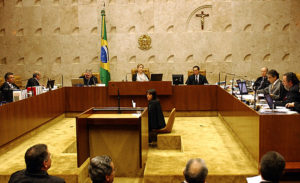Leaders in Brazil, Hong Kong and the U.S. Coerce Judiciaries
 Recent clashes between the judiciary and their political opponents in Brazil, Hong Kong, and the United States showcase the rising tensions between backsliding democracies and the judiciary branches that check their power. In all three of these regions, this divergence of interests is leading to conflicts between the democratic ideal of an impartial judiciary and the realities of ambition and power.
Recent clashes between the judiciary and their political opponents in Brazil, Hong Kong, and the United States showcase the rising tensions between backsliding democracies and the judiciary branches that check their power. In all three of these regions, this divergence of interests is leading to conflicts between the democratic ideal of an impartial judiciary and the realities of ambition and power.
In Brazil, new President Michel Temer recently nominated close political ally Alexandre de Moraes to the Supreme Court. The position’s previous occupant, Teori Zavascki, died unexpectedly in a plane crash mere weeks after he was tapped to lead a corruption probe that implicated over two hundred Brazilian politicians and businessmen, including President Temer. Temer’s political opposition has claimed foul play and called for an investigation. In the meantime, it is unlikely that Moraes, who previously served as President Temer’s justice minister, will be as eager as the late Zavascki to investigate his old boss’s alleged ties to corruption.
In the United States, President Trump nominated Neil Gorsuch to the Supreme Court amid condemnation from members of both parties for his continued attacks on the independence of the judiciary. These attacks began in the summer of 2016, when then-candidate Trump disparaged and verbally attacked the federal judge presiding over a fraud case against Trump University. Recently, Trump redirected his vitriol toward Judge Robart of the Ninth Circuit, who issued an emergency stay on the Trump administration’s travel ban from 7 Muslim-majority countries. Trump has denigrated Robart as a “so-called judge” and called his stay “ridiculous.” These attacks have stoked concerns on both sides of the aisle about the new president’s commitment to an independent judiciary—particularly timely, given that he is requesting that the Senate confirm his Supreme Court nominee while squaring off with sitting judges.
Unlike the Brazilian opposition, the Democrats have not yet been able to launch a corruption investigation into the new administration despite numerous allegations of financial conflicts of interest between the White House and other branches of Trump’s business empire. Like Brazil, however, the violation of political norms to intimidate and coerce the judiciary threatens to delegitimize American governance and facilitate rampant corruption.
To see the consequences of a judicial system cowed by outside political authority, one need not look further than the courts of Hong Kong. For decades, the Hong Kong judiciary was independent and functioned as a proud pillar of the city’s democratic society. Since reunification with the mainland, however, this independence has eroded drastically. Late last year, Hong Kong’s highest court ruled that two democratically-elected representatives would be permanently disqualified from assuming their seats for allegedly inserting anti-mainland rhetoric into their oaths of office.
Thankfully, neither Brazil nor the United States have reached this level of obeisance to their respective political branches—but the regression of Hong Kong’s judiciary from an independent body to an organ of the Chinese Communist Party presents a stark warning for those who would politicize judiciaries in the Americas and around the globe. The impartiality of these bodies is critical for the health of societies wishing to prevent corruption and preserve the rule of law.
